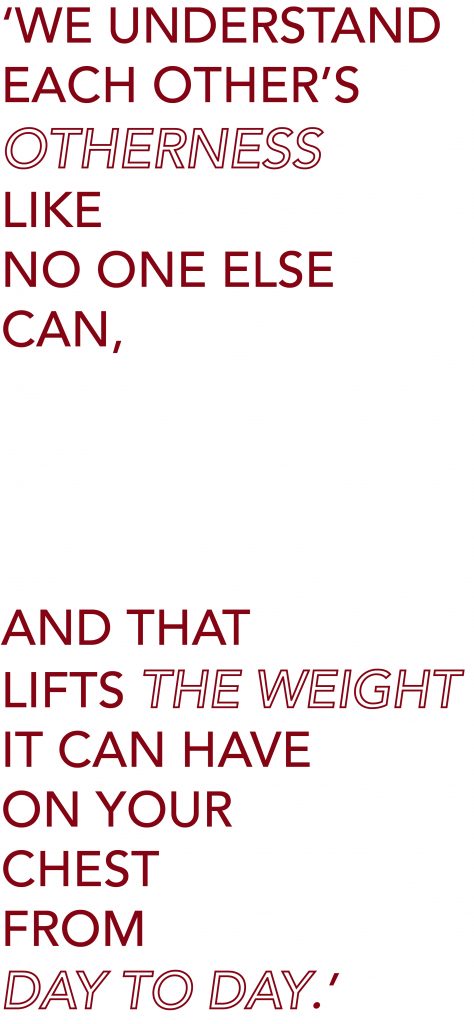The thing about belonging to a marginalized or minority group is that most of your experiences as a human being seem to be dictated by an external viewer, a narrative told about you and your reality that seems to be completely separate from the actual, exact experiences you live. The way you relate yourselves to others (especially those outside of the group), on the most minimal level is affected by these perceptions and power structures so deeply constructed into mindsets about the “other.”
Essentializing narratives do a fantastic job at convincing everyone that those who are “other” are all the same through their own subtle means. These, on a larger scale, can almost be considered deeply sinister in the way that they manage to affect the most basic of things. The narratives seep their way into the consciousness of the person who is considered “other” as well, making a lot of our behaviors and reactions to interactions/external factors what we are told what they should be – or what Judith Butler might simply call a “performance.”

As a Mexican woman, part of a larger diaspora of people who have left my home country to find different lives and opportunities, exchanges where you are reminded of your otherness are quite common, especially in a place as small as Scotland. The eye widening ignorance of people in places like the United States is really offsetting, with comments ranging from asking me about whether I go to Cancún “like every weekend” (it’s around an 18 hour drive from Mexico City) to unsolicited remarks about the supposed violent and sexual degeneracy they believe inherent to my country (after having been to Tijuana once in college). At this point, getting asked if I can supply people with cocaine or whether I’m related to el Chapo Guzmán is something of a running joke seeing how surprisingly often it has happened. A classic casual chit chat might go along the lines of:
“People like get shot in Mexico, don’t they?”
“Of course, yeah. Don’t they also in Glasgow?”
So I roll my eyes and go about my day knowing I cannot and should not be affected by comments that either come from a place of ignorance or an actual desire to tick me off. Though still recognizing my immensely privileged position as a white person studying a university degree abroad, the factor of my otherness still bears a bit heavily upon me the way it does on everyone else who fits into the category of “other” for whichever reason that label is ascribed to you. It is something you hope to be able to discuss with people who can understand what you are going through, which though not inherently a traumatic experience, simply sets you apart from a crowd and can make you feel in one way or another, alone or isolated.
Finding other latinx people at university was something that I managed to do within a week (funnily enough, more difficult than what I was accustomed to), something I deeply felt I needed to do from the beginning. Older latinx students at St. Andrews with whom I interacted throughout my first year gave me the same advice: find a group of latinx people that will stick with you throughout your time here. It’s a survival tool, a way to soften the blow, and a way to make your experience fuller and less intimidating. You gravitate towards people culturally similar to yourself in many of these situations, specifically because being unable to share your state of otherness with people undergoing the same feeling can really be suffocating. Though interacting with people culturally distinct to yourself does and can render positive results, it always helps to have someone accompany you on the path to properly navigate your way into and around your newfound state as “other.”
All of the diasporic latinx individuals I have met so far get the same comments from all kinds of individuals being outside of their home countries. We have all dealt with the same level of exhaustion from the essentializing bullshit thrown our way – and for this reason, no matter how different some of us are, we form connections.
Our commonality, to a great degree, lies in our otherness, our rejection of that otherness, and understanding, almost like an inside joke, just how fundamentally incorrect the judgement people hold over our heads truly is. At get-togethers, parties, and dinners, nonchalant discussions sharing our experiences and exchanges that demarcate that otherness has evidently become so commonplace that it causes us to laugh with each other instead of making us roll our eyes. What categorizes us as latinx in the UK is not a shared essence, but rather the way our latinidad is perceived externally and how deeply monolithic that assumption surrounding our identity can be.
A prime example of just this is the way in which my latina friends have all been categorized as “spicy” and “submissive” at some point or another by a partner at any capacity. Being from Latin America makes us the orientalist fetish of (mainly) men who think they know who we are, who assume that our latinidad has something inherent within it that makes us more easily manipulable than Western women. My outright American sounding accent has prompted requests from people to “turn it down a bit” to sound more latina, more palatable and more exotic. Sometimes it’s like we are defined by our incapacity to fit into the cookie-cutter essentializing narrative of what a Latin American woman should be in a sexual or romantic setting. It’s also something we laugh about together as we navigate our dating experiences- something I would probably be overwhelmed about if I didn’t have an outlet to share what I’ve gone through personally. We understand each other’s otherness like no one else can, and that lifts the weight it can have on your chest from day to day.
In our state of otherness, I realize, it is mainly us who hold ourselves up, keeping each other from drowning in a subtle but oxymoronically overwhelmingly present loneliness that has the capacity to deeply hinder our life experiences. These connections, undeniably important, are necessarily geared towards building ourselves up and out of that otherness in general – geared towards knowing we are humans outside of that otherness by being able to openly share to people who understand and know our pain and annoyance. Our alienation does not define us, but our capacity to defy it perhaps does.
Photography by Isabella Baxter




